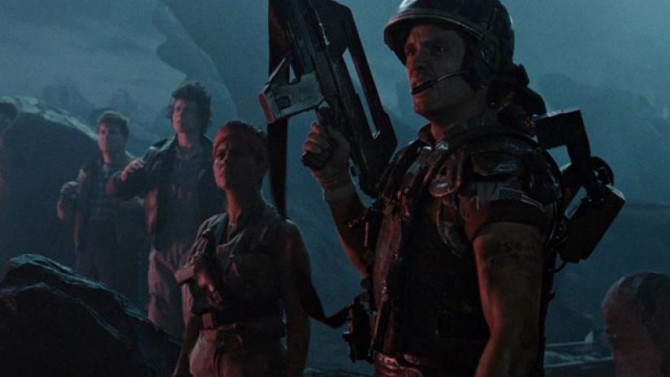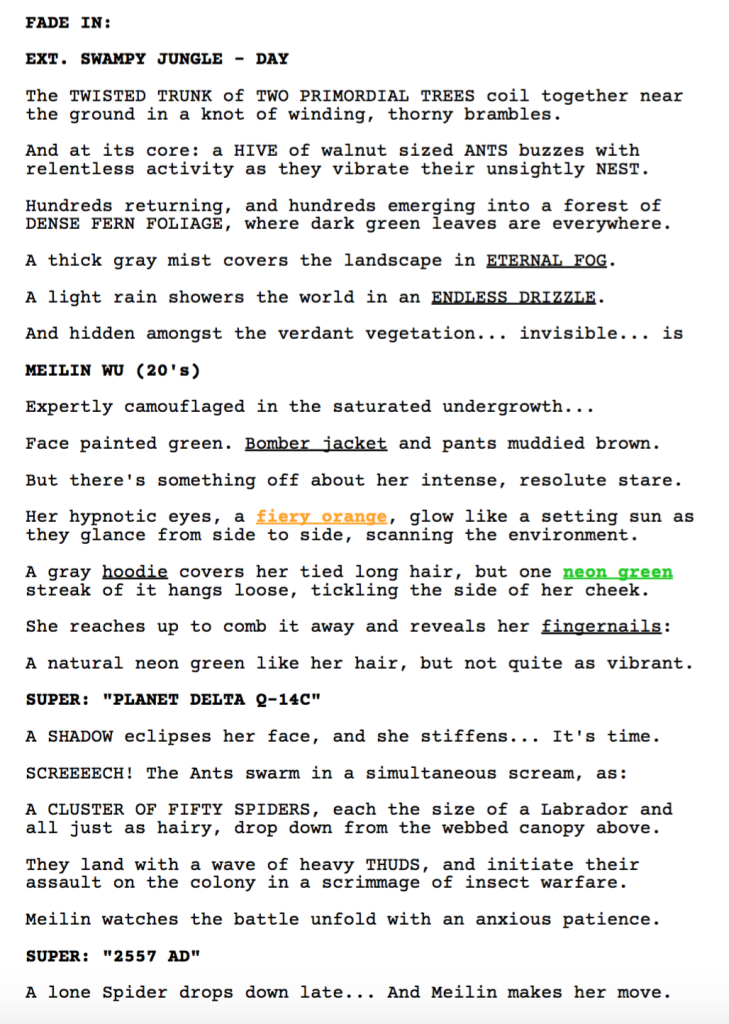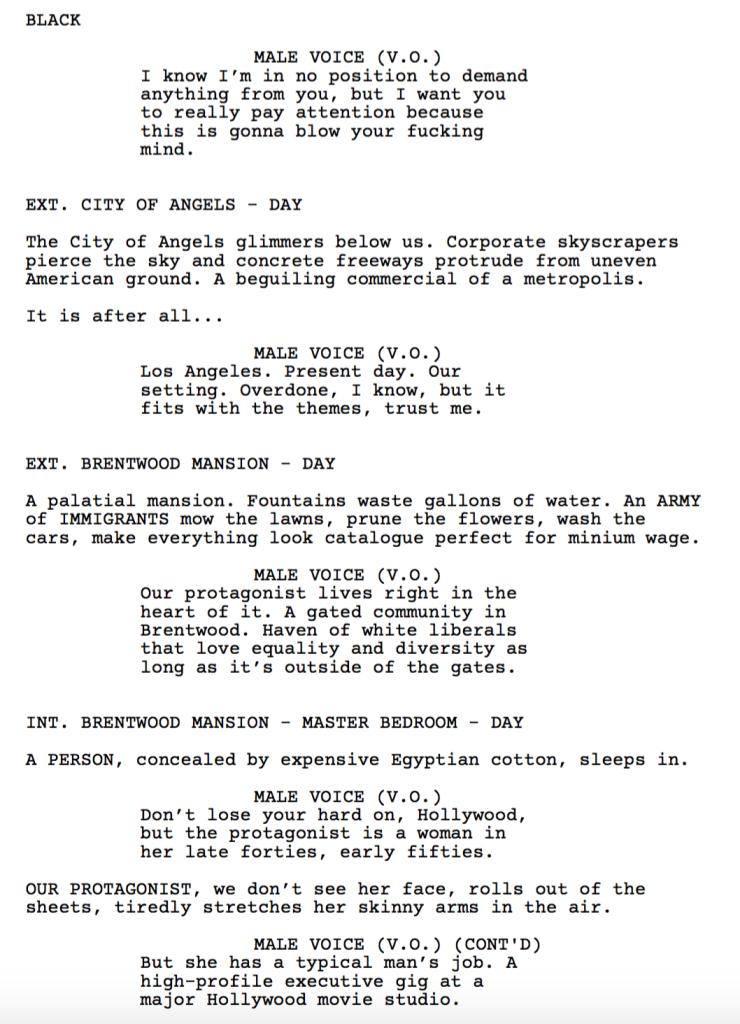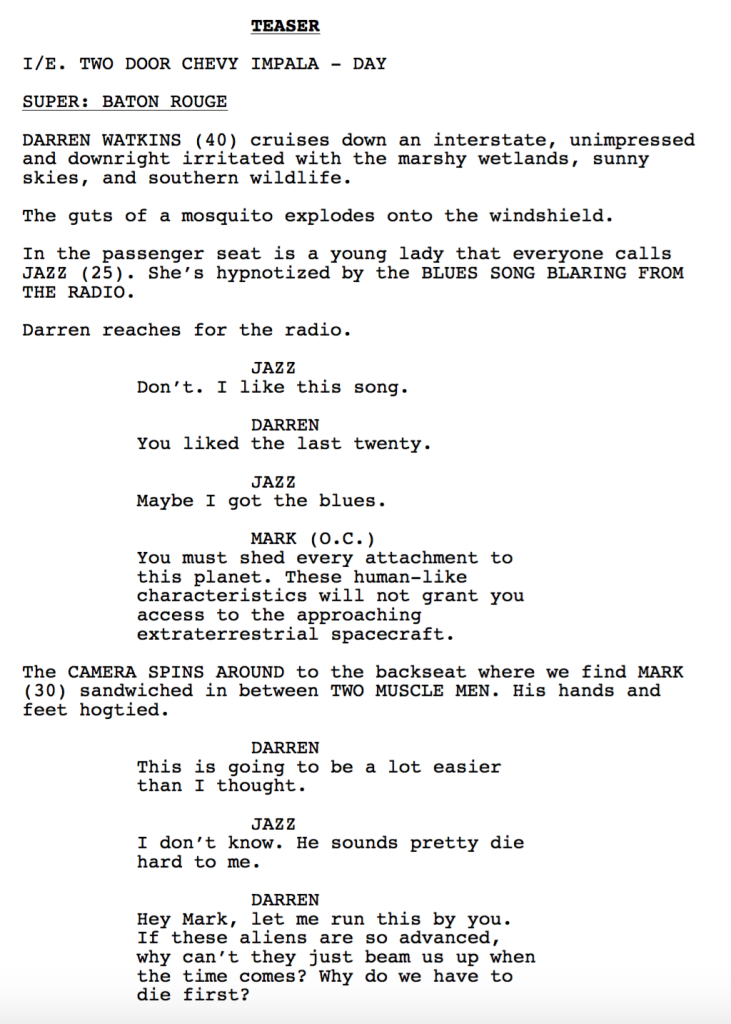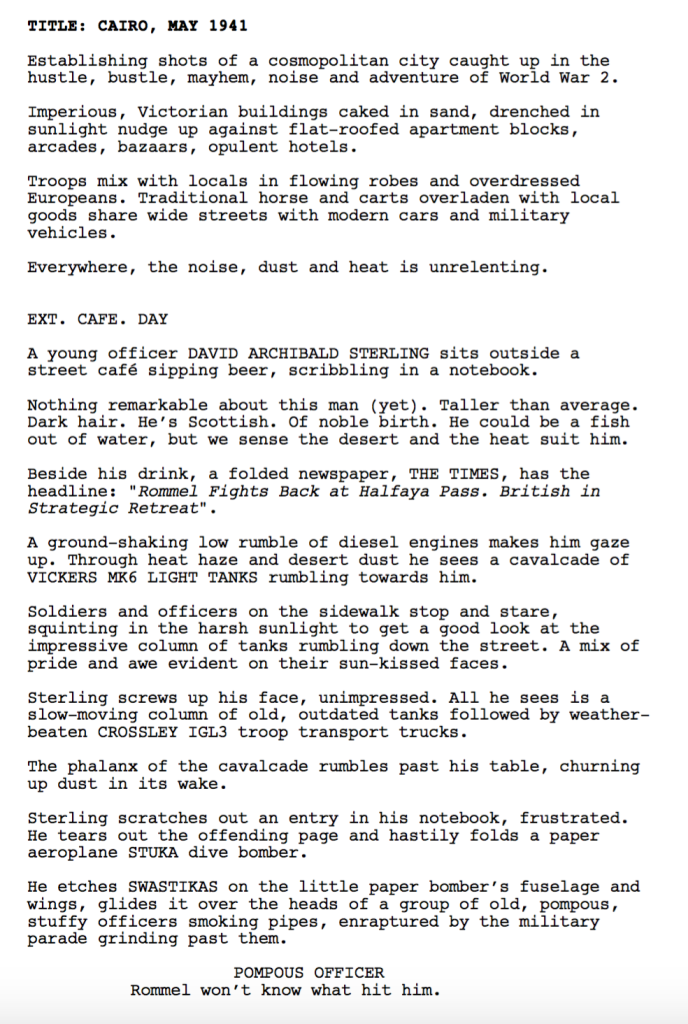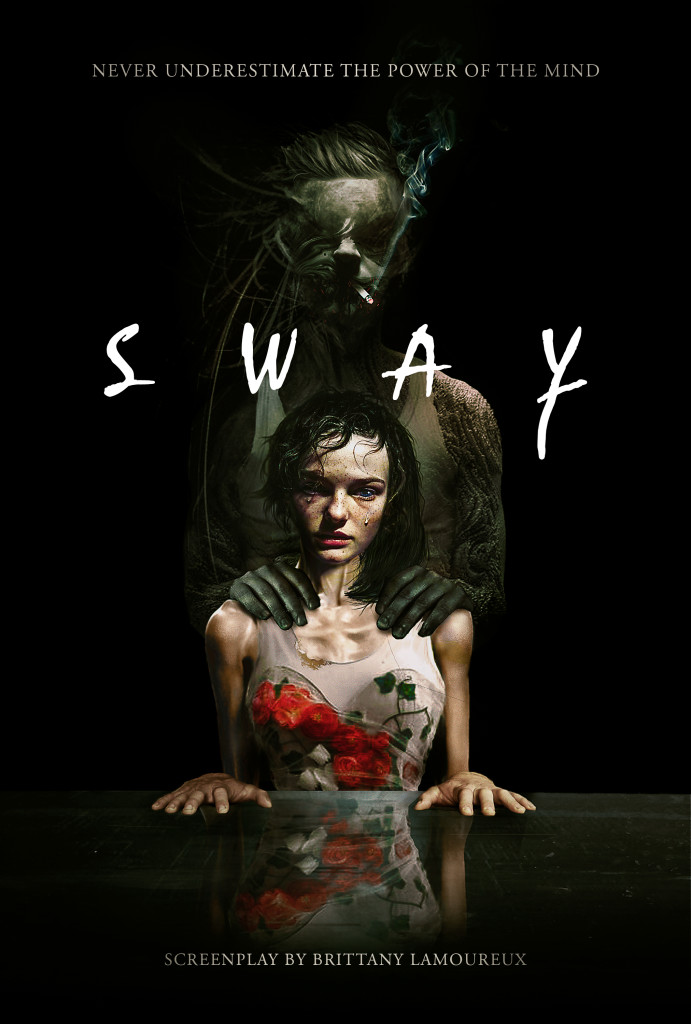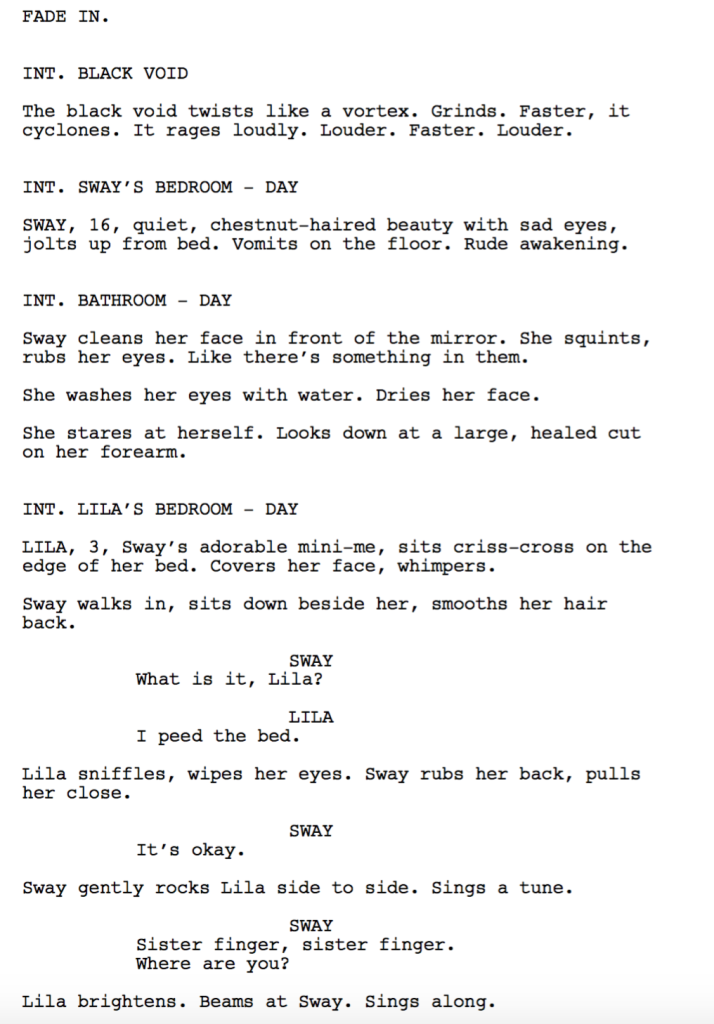Search Results for: twit pitch
Mayhem Jones, you ask? Who’s that? Isn’t the writer of the number one script, Sophie Dawson? Well, around here we’ve always known her as Mayhem. Not just because it’s her online alias, but because she’s always up to some kind of mischief. The good kind of mischief, of course. Speaking of mischief, Mayhem’s script, Headhunter, follows a cannibal who selects his victims based on their Instagram popularity. Today I ask her about that script, how she develops her ideas, and how she crafted the voice that won her so many fans around town. Enjoy the interview!
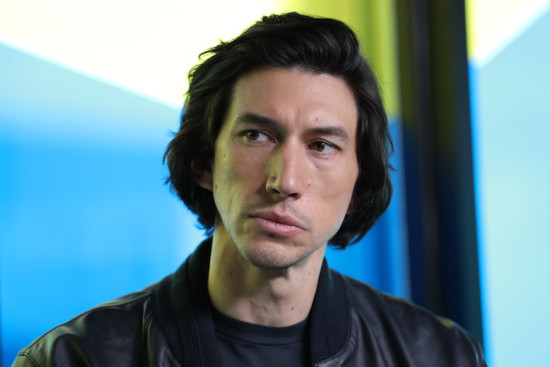
SS: First off, congratulations! This all must be a bit overwhelming.
MJ: Thank you! I work a crappy retail job and this customer was arguing with me about leggings as my phone was blowing up with the news. I’m obsessed with Franklin Leonard and his annual Black List – my goal was to make the very bottom of it at some point in my life, so HEADHUNTER hitting #1 left me speechless. I quickly texted a friend who squealed: “I just showed the manager of H&M your name in Deadline!” and I was like, “Do you even know this person??” and he went, “No, but we’re both FREAKING OUT!!”
SS: By the way. There are many a rumor about where you live and what you do. I recently heard you live off the grid in a forest so big that it hasn’t been fully charted by the United States government yet. Can you tell us anything about where you reside or is that top secret?
MJ: TOP SECRET. I enjoy being incredibly difficult to reach, so when my managers insisted I set-up my cell phone’s voicemail (for the first time ever, I might add) stating my actual name and stuff… I was livid. It’s been 4 months and I’m still pissed! It’s really bizarre seeing people mention a script using my real name now. Don’t they mean Mayhem Jones??
SS: Why do you think, of all the scripts you’ve written, that Headhunter is the one that clicked with people and helped you break out?
MJ: Let’s face it, most of my earlier dialogue-driven work exploded all over the page in an insane, uncontrollable frenzy. With HEADHUNTER, I slowed down a bit. It’s still weird – but with less spin outs, more control! The producers and executives I talked to said it was a fun, interesting read that felt so different from what they’re normally given. Most importantly: you only need to find ONE PERSON to love and champion your script, and I hit the freakin’ jackpot finding a team who immediately took to the material. (Ha ha, sickos!)
SS: Can you tell us a little about your process for writing a screenplay? Do you jump right in? Do you meticulously outline?
MJ: I have a 40-beat chart that I use color-coded post-its to fill with one sentence scene pitches. I transfer that over to a word document where I go deeper: scene summary, links of research I might need, and “dialogue ideas”. I’ll transfer that into a Final Draft document with each beat numbered for clarity. I then write 2-3 scenes per day – withholding sleep, and sometimes food – until I make that quota. Once I have a more formal draft, I change my quota to 5-10 pages per day to more closely shape the scenes. I see dialogue and scene descriptions as totally different things, so I’ll do 10-20 pages a day of ONLY scene description work/polish, then switch to 5-10 pages a day of ONLY dialogue polish. I then do more broader passes of 20-30 pages per day.
Towards the end, I’ll do a “reader engagement” check – do I skim quicker over certain scenes? Those need more work. With a dialogue-heavy script like HEADHUNTER, I’ll have easily gone through it 100+ times, sometimes only changing a few words or moving a comma. I’ll go over the first 5-10 pages an extra 30+ times because it’s critical to gain the reader’s trust early.
SS: Headhunter has a BIG main character. Can you share your approach to character creation?
MJ: When I’m writing more voice-y stuff, it’s essential I relate in some way to the main character. This way, they can serve as a vector for my thoughts and opinions – which will lead to more energetic prose. I wanted to do a commentary on everyone’s 24/7 addiction to social media, so it made sense to make a cannibal character (us!) literally consume Instagram models (social media!), right? In general, I love the exploration of dark/demented characters that are presented in a more digestible way (uhhh, no pun intended). When people heard about HEADHUNTER early on, they were like: “Ewww! I’m not reading a script about a CANNIBAL!!” But once they found out I wrote it, they were like “Oh… OK. I know Sophie will do something different with it.”
SS: I suspect your dialogue was a big reason this script got passed around. What’s your secret to strong dialogue?
MJ: Dialogue succeeds when it’s natural, so I go with my “first take” as much as possible. The more you tweak it, the more awkward it sounds. I’m neurotic about looking up words I don’t know, and keep notes of dialogue ideas that pop into my mind. Even if I’m about to fall asleep – I’ll wake up and write it down. I’ll then go through my script and input these lines where they’d make the most sense. I was in Whole Foods listening to a pretentious douche brag about the price of avocados, and was like – my main character in HEADHUNTER could totally troll someone like that before killing them. Later, I read an article about how it rains diamonds on the planet Neptune. That fact was incredible! It’s a little too random to work into a conversation, but seemed like the perfect annoying ice breaker for an Uber driver.
You can even get more nit-picky if you want, and use rhythmic cadences. In HEADHUNTER, every time the main character wanted to close his eyes and disappear to another place – the description of the places he was daydreaming about had a certain rhythmic pattern. Towards the end of the script, when these daydreams were becoming more violent/unhinged, I slightly changed the rhythm (achieved by simply using words with different amounts of syllables) to be a bit “off” – so the sequence was more jarring.
SS: You get endless compliments about your unique voice, and rightfully so. Can you give other writers tips on finding their unique voice?
MJ: Ask yourself: what annoys the SH*T out of you? Start ranting about it. Seriously. Pull up a word document or whatever and write a paragraph about what pisses you off the most. Now, read it. Notice how animated you are? Notice how specific you are? Listen to yourself when you get angry – whether it’s about the Tesla that just cut you off, or the friend trying to offload their $1 Lake Tahoe timeshare on you – that super raw, inner monologue of yours is your “voice”. Apply that inner energy to scripts that deal with topics you have opinions on, and I guarantee you’ll notice a different kind of writing.
SS: What everyone is always asking is how to get an agent, how to get a manager, how a script goes from one’s computer to “sale.” Can you tell us, in as much detail as possible, how you got your agent/manager?
MJ: HEADHUNTER made the quarterfinals/semifinals in the 2020 Academy Nicholl Fellowships, and my friend was like, “YOU GOTTA QUERY PEOPLE RIGHT NOW!”. I hate querying so much, but I trolled the interwebs for awesome managers – begrudgingly sending the simplest/least annoying pitch I could to one per day. Someone on Reddit posted a Twitter thread by literary manager John Zaozirny, head of Bellevue Productions. It was about how he manages clients… I instantly became obsessed! I sent him a quick pitch, and amazingly he responded with a read request.
I was getting more read requests and even meetings – but after a zoom with John and his colleague Zack Zucker, I knew I wanted them in my life ASAP!! (I was right – they don’t mind my freak outs, ALL CAPS EMAILS, and ridiculous ideas, ha ha!) John and Zack started sending out HEADHUNTER, and it led to an astonishing six agencies wanting to know more about me. It was excruciating to decide (as many of these fabulous, fabulous agents have clients on this years Black List!!) but I have a wonderful team of people as crazy as me.
SS: Headhunter won Amateur Showdown and was reviewed on Scriptshadow a while back. Was there any feedback from the commenters you got that day that helped you improve the script to what it is now? If so, can you highlight some?
MJ: Honestly, the biggest complaint from that weekend was the genre. Everyone HATED that I called it a drama, saying it was more of a dark comedy. So I started labeling it as a dark comedy/satire. Except for some minor tweaks, it’s pretty much the same! The biggest change? A modified title. My manager John went all Sean Parker (from that famous scene in THE SOCIAL NETWORK) and said: “Drop the ‘The’. Just – HEADHUNTER.”
SS: I’ve found that there’s a direct correlation between a writer’s ability to stay positive and the length of time they stick with the craft. And since it takes a while to get good at this screenwriting thing, possessing the skill of remaining positive is very important. You are well-known for your positivity. Can you share your secret?
MJ: First off, you have to be in complete and utter denial about your odds of becoming a screenwriter. Like, it can’t even occur to you that it might not work out. You have to – naively as possible – keep marching forward. You gotta be a video game character that just keeps dying then regenerating. Second: you have to get over yourself, and get over yourself QUICK. I’m not perfect, not every script I write will be great, and I still have an unimaginable amount of things to learn about screenwriting. Self-deprecation and an overall humorous outlook on life (and its setbacks) is essential!
If one script doesn’t work out, maybe the next one will. Enjoy the hell out of any praise you get, but also get rejected often and early. I’ve been called EVERYTHING – from a “ranting maniac who probably spends her free time assembling robots out of old dishwasher parts” and “a mind numbing, insufferable dialogue hack” to a “plot-less blowhard who only writes to hear the sound of her own voice”. I’ll then dramatically read these jabs to my Mother, who’s like: “Sophie, most of those things are true.” HA!
SS: What are some of the tips you’ve learned over the years that have really improved your screenwriting? I like to call them, “Ah-ha,” moments. Can you give us a few of those tips that, when you heard them, you thought, “Oh my God, I need to start doing that!”
MJ: There’s so many great lessons everywhere, but for me one really stands out: I love the complexity of the opening scene in Aaron Sorkin’s THE SOCIAL NETWORK. The way the conversation is so out-of-step – with Mark Zuckerberg both jumping forwards and backwards on different topics – while Erica Albright just tries to keep up (being a few paces behind, or ahead). I’ll never be qualified to breathe the same air as Aaron, but this kind of jagged word play is interesting to watch and incredibly fun to write! If it fits the script I’m working on, I really like having an aloof character not quite on the same page as whoever they’re talking to.
SS: You’ve sent me, I believe, 5 scripts over a period of 8 years? And I believe you’ve written 20 scripts in total. In an industry where you get so little positive feedback until you make it, how did you stay motivated during that time?
MJ: WOW, has it been that long?! I feel like I started to take screenwriting “seriously” about 3-4 years ago. Because I was just writing off-and-on as a hobby (taking year-long breaks) during extremely demanding publishing jobs in New York City. But as my scripts got more and more positive feedback, I was like – wait, should I try to make this a career? I was just so swept up in climbing the ladder in a completely different industry that I wasn’t thinking about it. I just wrote for fun, experimenting in drama, dark comedy, and sci-fi to figure out my strengths and weaknesses.
I wouldn’t even use the term “motivated” to describe how I kept going… I’d rather say: have malignant, narcissistic masochist tendencies (seriously, be a complete sadist) with an urge to keep writing and throwing your work online. Amateur Offerings Weekend is one of the BEST things your site has ever offered to aspiring screenwriters – and was one of my biggest motivations to write, knowing I could pitch you some wacky crap and maybe you’d give me a chance. Thank you so much!
SS: You are, of course, welcome. One last question. You’ve got such an incredible imagination. What was your craziest script idea? Can you pitch it to us?
MJ: I had a terrible experience at the retail store JCPenney a couple years ago, so I came home and decided I was going to write a screenplay called: JCPENNEY IS A WHORE. I basically just listened to Beck albums on repeat while crafting this story about a suicidal man having 24 hours to locate someone’s stolen Justin Bieber concert ticket – before a bomb under that seat blew up the LA Staples Center. It opened with the protagonist tied up in Richard Simmons basement, having been lost in a human poker match to his insane maid.
There was only one scene that took place in an actual JCPenney (right before the main character went to Leonardo DiCaprio’s house for a party). It basically had everything you NEVER want in a script: sex robot-addicted cops, murders at Jack in the Box, a pimp with itchy pants syndrome who’s obsessed with vintage Nintendo systems, Chuck E. Cheese, and cameos by Amanda Bynes and Tish Cyrus (Miley’s mom). It never got past the outline stage, DON’T WORRY!!
This screenplay battle regarding the movie, “Yesterday,” has become an international story. Today, I review the original draft that led to the drama!
Genre: Drama/Fantasy
Premise: When a struggling musician realizes that he’s the only person on the planet to remember the Beatles, he starts passing the band’s songs off as his own. Only, they don’t create the stir he expected.
About: Jack Barth was a 62 year old screenwriter who had been trying to get his scripts made for over 20 years. The dream finally happened when Richard Curtis heard his pitch for a Beatles-inspired concept about a singer who wakes up one day as the only person on the planet who remembers the Beatles. Curtis supposedly (this is where the story gets murky depending on who you talk to) refused to read the script and went off to write his own version of the idea. Long story short, Curtis took the big writing credit, Barth got stuck with the smaller “Story By” credit, despite the fact that the two screenplays are [supposedly] very similar. Now Barth is taking his argument to the streets because he wants it known who really wrote this movie. You can read more about it here in this Uproxx article. Today, I’ll be reviewing Barth’s original screenplay, the one that would eventually become “Yesterday.” His script is called “Cover Version.”
Writer: Jack Barth
Details: 103 pages, Version 10b 01 July 2016 (posted by Jack Barth on Twitter)
There’s a romanticization about the “unmade” draft of a script. That was one of the reasons I was inspired to create Scriptshadow. I wanted to read all of those famous unused drafts that were so much better than the movies that made it to the big screen.
But what I found was that, 99% of the time, it was b.s. It certainly made for a good story – these unused genius screenplays. But they were always worse than the finished product. And most of the time, a lot worse. The best of these unused scripts were simply different. Same general story. Different choices. But none of them were genius.
That’s because, as fun as it is to claim, “The studio ignored a genius script to make an AWFUL film,” the reality is, it’s in the studio’s best interest to make the best movie they can. So given the choice between a good and bad draft, they almost always pick the good one.
If you disagree with this, show me the receipts. Name the movie that was terrible and the genius script that they overlooked.
Sure, there’s stuff like Source Code. I’m notorious for how much I loved that script. But even though I didn’t love Duncan Jones’ interpretation, I’m not going to sit here and tell you it was that different from the screenplay.
And, to be honest, I’m not even sure that’s what I’m looking for today. It seems like Barth is more interested in getting the credit he deserves for “Yesterday,” instead of being treated like this second hand leper who was only good enough to come up with the idea. I’ve always loved this concept so I’m curious to see what he did with it. Let’s take a look.
The year is 2016. Dan, the lead singer of Clay Enema, is in his 30s. His band mates, girlfriend Ella, Cesar, and Sykes, still enjoy jamming and getting the occasional gig. But the future isn’t looking good. It seems that no matter what Dan does, Clay Enema can’t breakthrough.
Then one day, Dan walks into a rehearsal and, to get warmed up, strums a few chords of the Beatles’ song, “Yesterday.” Curious, Ella comes over and asks him what the song is. He plays along. “Ha ha. Just something I’ve been working on.” Cool, she says, let’s try it out. He laughs her off and gets down to business. He’s got this new song he’s positive will be a hit and he wants to practice. But the band keeps telling him, no, we want to play that other song you were working on.
Naturally, he thinks they’re messing with him so the whole thing turns into a fight and he storms off. But there was something about their conviction that they’d never heard the song before that piques Dan’s curiosity. So he looks online. And he goes to the record store. And he checks his CD collection. There is no mention of the Beatles ANYWHERE!
So Dan apologizes, gets the band back together and starts teaching them all these “new songs” he’s been inspired to write. And what do you know, they start booking more gigs.
People like the songs. But to Dan’s dismay, they don’t LOVE the songs. And so the band’s success stalls. They become big enough to go on small tours and make a living. But not globs-of-fans-darting-across-streets-crying-just-to-get-a-look-at-them big.
Dan doesn’t get it. These are the greatest recorded songs in HISTORY. Why isn’t Clay Enema as big as the Beatles? Dan’s dismay eventually leads to the group breaking up and Dan trying to build a Beatles replica band, complete with the 60s costumes and haircuts. But it doesn’t work.
Eventually, Dan comes to the realization that if there was never a Beatle, John Lennon wouldn’t have been assassinated. So he goes on a quest to find the never famous Lennon, who it turns out is a fisherman, and Dan confides to Lennon what he’s done. Lennon, who just may believe him, tells him that the reason the songs aren’t hits is because Dan didn’t write them. They’re not true to who he is and therefore they can never be hits. Dan thanks him, ditches the Beatles catalog, and starts writing his own songs again. The end.
So there are two questions being asked here.
1) Which version is better?
2) Did Curtis “steal” from Barth’s script despite the fact that he claims to have never read it?
I’ll deal with the first question first. Of the two versions, I think Yesterday was better. But not by much. Basically, Curtis asked the question, “What kind of movie does the audience want to see?” Whereas Barth asked the question, “What would *actually* happen here?”
Both avenues are interesting. There’s a dramatic irony sledgehammer with Curtis’s version whereby we know that the Beatles songs are amazing. So we revel in this opportunity to witness someone bring those songs into the world for the first time. We WANT his success. We WANT to see everybody scream and go crazy over this guy. Because we’re in on the secret. And it’s an extremely exciting secret to be a part of. Who doesn’t want to watch audiences experience “Here Comes the Sun” for the first time?
Barth’s version is more grounded and realistic. It asks the question, can you separate the music from the artist? Is the artist so intrinsically connected to the songs that become massive hits that they’re a package deal? You can’t split them up.
While I think that’s an interesting question, it leads to a much more subdued experience. And my experience with movies is that they don’t work well with middling, with average, with subdued. Movies work best with extremes, especially when you’ve got a big idea. John McClane isn’t running around some two-story insurance building in downtown Lincoln, Nebraska. He’s running around a brand new state of the art skyscraper in Los Angeles.
So while I respect that Cover Version is more realistic, it didn’t give me that big whirlwind celebrity experience that Curtis’s version did.
With that said, Barth’s version is still good. Because it is more realistic, it has a clearer theme, which is that your art has to come from you. It can’t come from someone else.
Now when it comes to the second question, things become fuzzier. And as it’s been a year since I’ve seen Yesterday, I don’t remember all the details. But the two things I’m seeing people bring up online about Cover Version that prove Curtis read Barth’s script despite claiming not to have, is the John Lennon thing and the Harry Potter thing.
I can tell you right now that neither of these moments convince me that Curtis read Barth’s script. And I consider myself somewhat of an expert in this area because I’ve heard tens of thousands of pitches. And I’ve read thousands of screenplays, many of which cover similar ideas. What I’ve found is that writers choose similar characters and ideas more than they realize. That’s because we’re all fishing from the same well. The same media cycle. The same shows. The same movies. The same pop culture. So most writers think similarly. (Screenwriter Pro Tip: When making any major decisions in your script, ask yourself, “Would another writer think of this?” If you think maybe they would, come up with something else!)
I would be willing to bet that if you gave 10 screenwriters this idea, 7 of them would’ve come up with the John Lennon scene. And I say that because it’s kind of obvious. Any good writer would naturally realize that if there was no Beatles, John Lennon never gets assassinated. Which means he’s alive. And if you have John Lennon alive, you put him in the movie.
I’d also assume most writers would make that a poignant important scene late in the film like both writers here did. Where things get fuzzy is that, if I remember correctly, John Lennon in Yesterday did some job by the sea? And here, in Cover Version, he’s a fisherman. So that’s a legitimate gripe. You could argue that that’s not a coincidence. Still, I don’t know. It’s definitely not a smoking gun situation.
And then with the Harry Potter joke at the end, that’s another thing that a lot of writers would come up with. If nobody remembers the Beatles, theoretically, maybe there are a few other famous British celebrities that never happened, which would be fun to make a joke about. And who’s more well known in the UK than Harry Potter? So that joke doesn’t convince me of anything.
Look, the reality of the situation is that these things are never black and white. I could see a situation where Curtis had someone cover Barth’s script for him and give him the broad strokes of Cover Version so he could make sure he wasn’t copying the major plot points. You’d think this would happen if only for legal reasons. Maybe a couple of those ideas from the coverage seeped into Curtis’s script. Who knows?
But the truth is, these are very different screenplays. One of them asks, what happens when you become famous off another person’s songs and the other asks, what happens when you have the greatest music catalogue in history and you still can’t achieve success? Once the script diverges from that initial hook, it’s two different stories.
And look, a lot of people get screwed over with their breakthrough script. The deal is the bigger name gets the credit and the smaller name now gets a seat at the table. This is how it’s been for many many people who’ve broken into Hollywood. The complicating factor here is that Jack Barth isn’t some 23 year old wunderkind. He was a 62 year old man who’d been grinding away at his craft for two decades and credit matters more to someone in that situation. So it sucks he didn’t get it.
This leads to a bigger discussion where I don’t understand why someone like Curtis, who’s insanely successful – even if he did write a story that was 90% different from Barth’s – why not just give Barth equal credit? He needs it so much more than you do. That’s the only part that bothers me. Do you really need any more residual checks? Is one more Porsche a year going to make you that much happier? What the hell happened to compassion and selflessness?
Anyway, Cover Version is a good script. And, more importantly, it’s a great idea. Writers can spend YEARS looking for an idea like this. And most never find one. So Barth gets credit for the most important thing of all in this case, which is that he conceived of a kick-ass movie idea.
Script link: Cover Version
[ ] What the hell did I just read?
[ ] wasn’t for me
[x] worth the read
[ ] impressive
[ ] genius
What I learned: Draw out your hook for as long as possible. One thing Barth did better than Curtis was that when it got to the hook point of the movie – Dan realizing that nobody on the planet knows about the Beatles other than him – Barth really drew it out. From when Dan first strums Yesterday to his band to a few days later where he tests out their first Beatles song together. I was bothered in “Yesterday” by how quickly we whipped through that section because, remember, the hook is why the audience is there. That’s what they’re most excited to see. They want that moment where the hero is playing the Beatles song to the people who have never heard of the The Beatles before. So give them what they want. Draw that moment out for as long as you can. No audience member is going to be mad at you for it.
Genre: Action/Adventure/Supernatural
Premise: The best black ops team in the business is sent to hell to assassinate Satan in order to stop the End of Days.
About: This script sold to Paramount in 2009. The writer, Andy Burg, used to work on family movies like K-9 and Alaska. He wrote this script to re-market himself as an action writer. However, the script is ironically stuck in – yes I’m going here – development hell. They did have another writer come in and rewrite the script in 2012, but there’s been no public update since then. This is the original draft that sold.
Writer: Andy Burg
Details: 104 pages
High concept?
Pfft.
High concept is for sissies.
Welcome to the ultra-high concept. A concept so ready to be a movie that it’s laminated in trailer blood.
Big budget spec IP isn’t as dead as some people think. Free Guy started shooting today. Methusaleh, about a man who never ages, is charging forward at Warner Brothers. If an idea is cool enough, a studio will want to make it. The projects are just harder to get through the system. They have to be developed well. They have to be stronger. Let’s see how this HUGE idea works as a screenplay.
An unknown narrator eloquently narrates a gun pointed at a head with a sack over it (“The guy presently receiving twenty times the surgeon general’s daily allowance of iron is the Captain”). In the corner of the room, we see eight other bodies. All with sacks over their heads. All dead. This is the Captain’s black ops team, the guys you send in to do the dirtiest of the dirty work.
The soon-to-also-be-dead “Captain” pleads for his life. The shooter removes the sack, allowing The Captain to see him. “You,” the Captain says, astonished. Then the guy shoots him. Turn around. The killer is a priest, who promptly shoots himself as well.
We wake up in hell. It’s ugly. Loud bloviating horns are summoning the recently deceased to hurry along. If you hesitate, giant beasts whip you into pieces. The Captain looks for the rest of his crew. Guys like Sgt. Toast (half his face was burnt to a crisp in a war), Shakespeare the Sniper, Tank the Albino, Amish, Newbie, Twitch, and a few others. The group is not happy to be here. Luckily, a cloaked figure pulls up in a boat and tells them to get in. It’s the priest.
The priest explains that he’s sorry for killing them but Satan has begun the End of Days. The only way to stop this is to kill Satan. And who better to kill Satan than the dirtiest strike team on the planet? Nobody wants to do this, but the priest makes a strong pitch. Since Satan and Hell are one and the same, if they kill Satan, Hell disappears, and they’ll all go to Heaven, where the accommodations are nicer. They begrudgingly accept the mission.
They first have to go through a hell jungle with creepy siren ladies who wrap you up in thorny vines. They then have to sacrifice one of their own guys to get to the next circle. They then take on a number of hulking beast creatures. They then have to sacrifice another one of their guys. They then find out that Captain is actually the Arch-Angel Michael (something he seems to be as surprised about as them), which is good news since they’re going to need more than clever comebacks to defeat Satan. And then, finally, when they face Satan, they learn that it was all a ruse set up by the Priest, who isn’t actually a priest, but rather the real Satan. I think. And now he’s going to take over earth. The end.
One of the most frustrating things in this business is hearing about a big cool idea and then when you read the script, it doesn’t deliver. This happens all the time. The writer was talented enough to come up with a killer concept, but not skilled enough to execute it. So what is the number one mistake writers make when they get that great idea? Anybody know? I don’t see any hands. Okay, I’ll tell you. THEY THINK THE IDEA IS GOING TO CARRY THE LOAD.
If they run into a problem while writing the script, they don’t fight hard enough to solve it. They put in a half-a$$ effort and figure the concept is good enough to offset any weaknesses. The attitude every writer should have, whether they’re writing Jurassic Park or Gosford Park, is to do their best with every character, every scene, every plot beat, every moment. Readers are more fickle than ever. If you bore them for even a couple of pages, they’re gone.
The number two mistake is that their script starts strong then nosedives. It’s easy to start strong with a great concept. The first act is basically an advertisement for your cool idea. However, what happens (and what happens in Hellified) is that the script gets sloppier the further along it goes. I’ll give you a couple of examples.
Early on, our team learns that in order to get to the next circle of hell, they have to sacrifice one of their men. I like sacrifice scenes. They’re the ultimate embodiment of conflict. The characters must butt heads with one another to choose who dies. And if no one wants to die, things get ugly quickly. So I liked the scene. But then they have to do the same thing when they go to the next circle, and then the next circle, and then the next circle. And, of course, the law of diminishing returns rears its demonic head. You’re in one of the most unique places in existence and you’re repeating the same scene over and over again?? Bad choice.
Then there was The Captain’s reveal as Michael. It was sort of cool. But the more we learn about it, the muddier it became. So he was Michael disguised as Captain his whole life and he just forgot? Ummm… okay. To be honest, once that happened, the script was dead to me. You sold your entire movie on a black ops team versus Hell. But now it’s Arch-Angel Michael versus Hell? You’ve eliminated the coolest element of your story – a human team of mercenaries versus Satan.
There was also a surprising lack of originality, despite a canvas that was made for it. Most set pieces amounted to big scary creatures running up to our team and fighting them. As a writer, you should be focusing on the promise of your premise. What’s unique about YOUR idea? What can we get from YOUR script that we can’t get from any other movie? Those are the scenarios you need to be writing. Hellified only had one of those. Anyone care to guess what the writer came up with? Come on. You’re in the pitch room with the producer. He’s got this project, “Hellified.” He tells you he can’t figure it out. There aren’t enough scenes that deliver on the premise. “Any ideas come to mind?” he asks. I would hope that you’d have an answer.
The ONE promise-of-the-premise scene takes place when a distant group of people start charging our team. As they get closer, the team realizes that it’s all the people they killed on their missions. Come back for revenge. Now THAT’S delivering on the promise of your premise. In a big concept like this, you need at least three major scenarios that accomplish this goal. Not one.
Hollywood has yet to figure out how to make a movie about the fantasy version of hell (where hell is imagined as a giant chaotic lava underworld). The CGI on these movies is always dreadful. And I’m not convinced that anyone wants to spend two hours in hell. Hell has the kind of imagery you can take for a minute or two. But two hours? Then again, if you’re an optimist, this is an opportunity to be the one who figures it out. I even think this story could make it work. But it will need a major rewrite to do so.
[ ] What the hell did I just read?
[x] wasn’t for me
[ ] worth the read
[ ] impressive
[ ] genius
What I learned: In the script, when describing a battle scene, the writer references “Troy” to help the reader imagine what the fighting looks like. When you’re referencing other movies, either in your writing or your pitching, don’t reference bad or average films. They’re basically the same thing in the eyes of Hollywood. And there’s a very simple reason for this. Troy was an okay movie that did okay at the box office. So when you reference it, you are saying that your movie will also be “okay” and do “okay” at the box office. When you’re spending this much money, nobody’s okay with “okay.” They want a hit. So when referencing, stick with classic movies and giant box office successes.
Genre: Drama with light comedic elements?
Premise: After their friends lose their daughter to a drunk driving accident, a neurotic New York couple find themselves unable to comfort and relate to their pain. But as the pair grapples with their personal inadequacies, their own relationship slowly begins to unravel.
About: Today’s script finished on both The Black List (top 20) and The Hit List (Top 10). The writer, Greg Kalleres, used to write commercials for high profile clients such as ESPN, Nike, Budweiser, Twitter, and Google. He has since segued into playwriting, and now, screenwriting. One of his more recent plays, Honky, is about how a sneaker blows up with young white buyers after a black man is murdered for the sneakers. You can read an interview with Kalleres about the play here.
Writer: Greg Kalleres
Details: 105 pages
It’s always interesting reading screenplays from playwrights because all of the emphasis is on the dialogue. Plays don’t work like cinema does, which is about showing (not telling). With plays, silence is death. Therefore, if actors aren’t talking a lot, something’s wrong. For that reason, it’s more important for playwrights to learn how to write good dialogue. And indeed, the dialogue in Our Condolences is the highlight.
Where playwrights get into trouble is with scope. They’re used to having one location, one stage. And while there are clever ways to switch locations, you’re basically spending long periods of time in the same place. You always see that when playwrights take on features. The stories are limited in scope.
Our Condolences introduces us to a proud liberal easy-going New York couple, James and Liz. James is a movie reviewer who trashes most movies even though he secretly likes them. And Liz works for a giant advertising company.
They’re headed over to Mike (a former SEAL who cashed in on his job by becoming an author) and Christina’s house, who they haven’t spoken to since they lost their young daughter when their car was hit by a drunk driver. On the subway, the two joke around about what it is they’re supposed to say in these situations. “I think maybe we do it right away. You know, just nip it in the bud,” James says. Liz, sarcastic, replies, “So, what, we walk in and immediately say: ”Hi guys, we can’t possibly know what you’re going through?!”” “I thought that was my line.” “Why are you being all Woody Allen about this?”
However, the mood changes when they get there. Mike opens the door, screaming that Christina is in the bathroom, threatening to kill herself. The three race to the bathroom and Liz unloads a line of bullshit about fighting for your life that sounds good in the moment, stopping Christina from going through with it. When they get home later that night, Liz is a wreck. She begins questioning everything – their relationship, their stupid jobs, their purpose on earth. Basically, she feels guilty for not experiencing the pain that Mike and Christina feel.
The next day, Liz goes back to see if everything’s okay but only Mike is there. After talking for awhile, Mike kisses her. Liz is confused but sort of goes with it. Mike makes a play on her, asking if she’s happy with a silly man whose contribution to society is ripping on movies all day. She doesn’t exactly disagree with this assessment.
Meanwhile, James randomly runs into Christina at the movies. After this happens a few more times, he learns that Christina is following the drunk driver who killed her daughter. When it becomes clear that it’s only a matter of time before Christina cracks and kills him, James will have to figure out how to stop her. And he may have to do it without a wife, since every day that goes by, Liz is less and less clear on why she married him.
Our Condolences starts off awesome. Passed my First 10 Pages test with ease.
I love movies that tackle serious subject matter in a humorous way. You’ve got to find the right tone, which is difficult. But if you can pull it off, the movie feels unlike anything else out there. It’s what creates that elusive “fresh voice” that Hollywood keeps asking for but can never define.
To give us a comedic take on a dead child is a brave move. And when you can combine that with easy-breezy dialogue that makes your eyes fly down the page, I was in screenplay heaven for the first 10 pages.
But then the writer began making strange choices. We go from fun and giddy to super serious and sad. Mike is a huge downer and Christina isn’t far behind. Not that I expected them to be happy, obviously. But the tone was set up to be funny. So I didn’t know why we all of a sudden dialed it up to 11 and became suicide central.
I eventually got used to the new tone. But then the characters are given these overtly goofy jobs that implied we were back in comedy land. Mike is a former SEAL who wrote a book that became a best seller for alpha men. Liz was working on an advertising job that revolved around building an 80 foot tall potato chip. James goes and sees silly big-budget movies that he trashes… then goes and sees them again cause he likes them.
At a certain point, I couldn’t lock down what the tone of this movie was! And if I don’t know what universe I’m in, it’s hard to enjoy what I’m watching. In fact, if you were to ask me, “What movie is this most similar to?” I couldn’t give you an answer. And that’s a big deal. Producers and studios are looking for any reason to say No. And if you can’t give them a comparable successful movie, it’s a No before you’ve walked in the door.
To be honest, I think the character jobs are what sunk this script. They feel like made-up movie jobs. These are jobs that are common in La La Land. But in the real world, nobody knows anybody who does this stuff. And the reason that’s important is because you’re writing a movie about real people and real emotions and grief. And if the people involved are doing Three Stooges routines while pitching the merits of an 80 foot tall potato chip in Times Square, it’s hard to take them seriously.
Actually, one of the easiest ways for me to identify newbie screenwriters is made-up movie jobs. Unless these jobs are organic to the characters to the point where nobody is going to question them, you want to use real jobs. The large majority of people have boring real jobs.
Despite that, the dialogue here is strong. There’s a naturalism to the interactions, a nice flow. If I learned any new dialogue tricks, it would be that dialogue works best when you’re playing against the emotion. The best scene in this movie is the first one. That’s because the characters are going to someone’s house who lost a child, yet their dialogue is light and playful and fun. Later on, when the dialogue lines up with the emotion, it’s more on the nose, and therefore not as interesting.
And that would be my big suggestion here. This script should’ve stayed with the tone it started with. Once it got serious, it lost a step.
[ ] What the hell did I just read?
[x] wasn’t for me
[ ] worth the read
[ ] impressive
[ ] genius
What I learned: After James and Liz jokingly fight each other in that opening scene, we get this line of description: “Suddenly they both begin laughing like idiots. This is the essence of them. This moment. And we can’t help but like it.” Don’t ever write this line! Never! You should never ever tell the reader what to feel. Readers read more stuff than you can imagine. And the one thing they’re never receptive to is being told what to feel or think. Let your writing do that.
Man, we’ve got a good line-up this week. A lot of times I’ll put a group of scripts together and think, “I don’t see a single winner in the bunch.” But today, we’ve got a few. I can’t share which ones I feel that way about, of course, because I don’t want to poison the voting pool. But this is the first pack I’ve seen in awhile that makes me confident a “worth the read” is on the horizon. For those playing Amateur Offerings for the first time, read as much as you can from each script and vote for your favorite in the comments section. The script with the most votes will receive a review next week!
And if you believe you have a screenplay that’s better than anything Hollywood is making at the moment, submit it for a future Amateur Offerings! Send me a PDF of your script, along with the title, genre, logline, and why you think people should read it (your chance to pitch yourself or your story). All submissions should be sent to Carsonreeves3@gmail.com.
Title: ABORT
Genre: Sci-Fi
Logline: Stranded on a remote planet with no memory of her past, a young woman struggles to fix her ship while trying to outwit a manipulative alien AI whose sole purpose is to repopulate its creator’s species by using her as a host.
Why You Should Read: ABORT is an edge-of-your-seat, unpredictable journey full of deception, twists, turns, and reveals, as our protagonist battles massive monsters, a dangerous climate, and conniving AIs… all while coping with amnesia. Billed as GROUNDHOG DAY meets ALIEN, ABORT provides constant goals and mini-goals, frequent ticking time bomb situations, and the stakes are as high as they could be… life or extinction. — While the use of color in the script has proven quite controversial, we are confident that it adds an extra layer to the read, and provides a much needed sci-fi ambiance necessary to set the mood of the futuristic, but isolated world we’ve created.
Title: A Writer’s Acts
Genre: Satire / Thriller
Logline: After a mysterious writer blackmails her through a pitch that reveals her darkest secrets, a meek female executive must take matters into her own hands to discover the source.
Why You Should Read: I constantly hear about how trendy “female-driven” and “Jane Wick” specs are, so I decided to write a female-driven Jane Wick that resulted in being about as far away from John Wick as possible. — This might be a cutting satire of Hollywood and filmmaking on the surface, but at its heart this is a story of female empowerment, institutionalised misogyny and liberal hypocrisy. So relevant in the era of #MeToo and Harvey Weinstein. And I guarantee you that all of these issues are handled without ever getting preachy or partisan. — Script also made it to the Semifinals of the Script Pipeline Screenwriting competition.
Title: Follow ME
Genre: TV – One Hour Drama
Logline: Follows the life of a cult deprogrammer who uses unlawful methods to liberate individuals believed to be brainwashed by controversial belief systems, all while struggling to find peace within himself.
Why You Should Read: I became fascinated by the world of cult deprogramming after reading strories about Ted Patrick, who is considered the “father of deprogramming”. Deprogramming refers to the act of forcibly removing someone from a cult, holding them against their will in an undisclosed location, and using psychological methods to unbrainwash them. The work of a deprogrammer can be liken to the job of an exorcist. You basically have a person who is under the influence of someone else, and it’s up to the deprogrammer to rid that person of that influence. With groups like NXIVM and Scientology being featured heavily in recent headlines, psychologist Steve Eichel estimates that up to 10,000 cults still exist today…and they are more dangerous than ever. People’s lives are being ruined. People who have families that love, care, and depend on them. These families hire deprogrammers to save their loved ones…no matter the cost. Although “Follow ME” is a fictional story set in present day New Orleans, a lot of what happens in the series is all too real.
Title: DEATH FROM ABOVE
Genre: Action/War
Logline: In WW2, during the darkest days of 1941 when Rommel was overrunning North Africa, a brilliant unorthodox Commando David Sterling singlehandedly recruits and transforms a bunch of unruly, undisciplined commandoes into the world’s deadliest strike force, the SAS.
Why You Should Read: WW2 is a period of military history which I love. For me, some of the greatest movies of all time have a link to this monumental, global fight for freedom. DEATH FROM ABOVE is a product of that passion, an unbelievable, untold, true story about the birth of the SAS in North Africa in 1941. DEATH FROM ABOVE fictionalizes real events to bring alive Sterling’s heroic battle against the stuffy British establish and Rommel’s formidible Africa Korps to form the world’s first strategic guerilla warfare unit — the SAS. It’s also a story of the unique men who formed this elite unit and their disastrous first ever mission OPERATION SQUATTER. DEATH FROM ABOVE has been written with franchise potential in mind, so just deals with the birth of the SAS and covers the period until the fateful first mission. The script also hopefully qualifies as one of the hot selling topics according to Scriptshadow, a based on true events WW2 story.
Title: Sway
Genre: Drama/Sci-fi
Logline: Sway, A talented high school pianist with a hard home life gains the power of mind control but must strengthen it if she hopes to escape the clutches of her abusive, drug-pushing cousin.
Why You Should Read: Hey, name’s Brittany! I may not comment much but I read SS everyday. Been reading, absorbing, mostly writing. I come here with a script I’ve been working on for a little while. I’ve always wanted to write a “superpower” story set in the real, real world with very personal stakes for the main character rather than world altering ones. There’s very little special effects and no over the top sci-fi jibber jabber. It’s pretty contained and written with a low budget in mind. Chiefly, this is a story about how abuse victims grow defense mechanisms to help cope with their abusers. In this case, the victim gains an actual superpower. I look forward to any helpful feedback from Carson and the awesome SS community!
One last note! If you’re going to criticize loglines or first pages, please do so in a way that’s constructive. I’ve seen a lot of bitter responses to loglines lately. We’re all here to help each other, not make each other feel bad. It’s easy to reword a negative critique into something that gets your point across yet inspires the writer to improve. Thanks.


